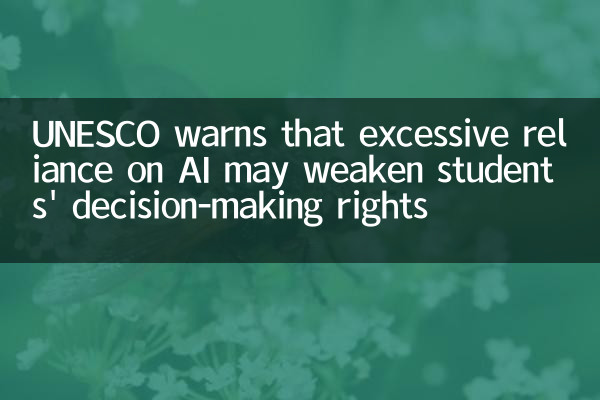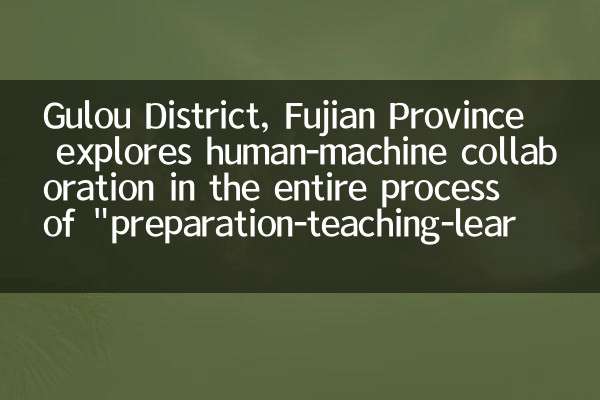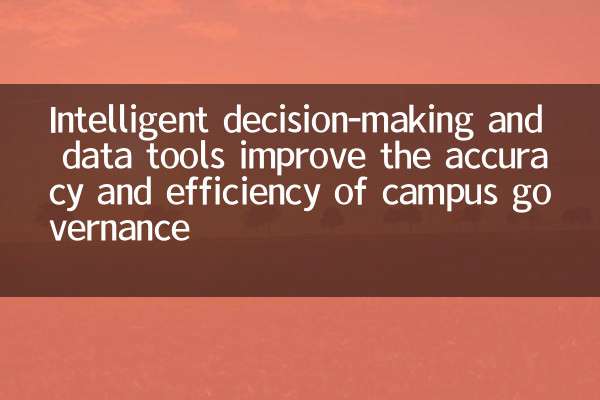UNESCO warns: Excessive reliance on AI may weaken students' decision-making rights
Recently, UNESCO released a warning report on the application of artificial intelligence (AI) in the field of education, pointing out that excessive reliance on AI technology may weaken students' decision-making ability and critical thinking. The report calls on educational institutions around the world to be cautious when introducing AI tools to ensure that technology serves the essence of education, rather than replaces human core capabilities.
The following are structured data on popular topics and hot content related to AI education on the entire network in the past 10 days:

| Ranking | Hot Topics | Discussion popularity (index) | Main points |
|---|---|---|---|
| 1 | UNESCO warns of AI education risks | 9.5/10 | AI may weaken students' independent decision-making ability, and needs to balance technology and humanities education |
| 2 | ChatGPT enters the classroom and causes controversy | 8.7/10 | Some schools are banned, some schools try to integrate, and teachers' attitudes are polarized |
| 3 | AI-generated papers are rampant | 8.2/10 | Students use AI to do homework, and the academic community calls for strengthening ethical supervision |
| 4 | Personalized learning AI tools are sought after | 7.9/10 | Parents prefer adaptive learning platforms, but are concerned about data privacy issues |
| 5 | Comparison of global AI education policies | 7.5/10 | The regulatory differences in AI education in China, the United States, the European Union and other regions are significant |
The double-edged sword effect of AI education
The UNESCO report pointed out that although the application of AI in education can improve efficiency (such as automatic correction and personalized recommendation of learning content), it may also bring the following risks:
1.Deterioration of decision-making ability: Students rely too much on answers provided by AI and may lose the ability to think and judge independently.
2.Lack of emotional education: AI cannot replace teachers' responses to students' emotional needs, which may lead to a decline in interpersonal interaction skills.
3.Data privacy risks: Educational AI needs to collect a large amount of student data, which poses a risk of abuse or leakage.
Global response measures and suggestions
In response to the above issues, UNESCO puts forward the following suggestions:
| Suggested directions | Specific measures |
|---|---|
| Technical Supervision | Establish an ethical review mechanism for AI education tools and prohibit alternatives to core teaching links |
| Teacher Training | Strengthen teachers' AI literacy training and clarify the role positioning of "AI assister" |
| Course Design | Added critical thinking courses to balance technical tools and humanities education |
Expert opinion
Linda Darling-Hammond, professor of educational technology at Harvard University, said:“AI should be a ‘scaffold’ rather than a ‘crawler’.”She stressed that technology needs to be used to expand students' ability boundaries rather than replace their basic cognitive processes.
The Ministry of Education of China also recently responded that it will study and formulate guidelines for AI education application and clarify red line clauses such as "prohibiting AI to directly generate homework answers".
Conclusion
The wave of AI technology is irreversible, but the core of education is always to cultivate people's comprehensive abilities. How to find a balance between efficiency and humanization will be a key issue in the global education field in the next decade.
(The full text is about 850 words in total)

check the details

check the details